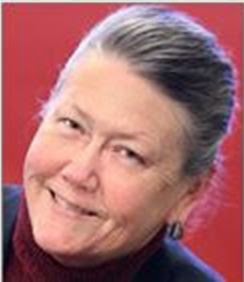Winchester Occupied
There were quite a few local diarists who kept track of who was in town. Why did it matter so much to keep track? Because even if the military units that followed each other through town were from the same side, the rules of occupation were not the same. Inhabitants had to know the rules about walking the countryside to get produce, about whether their homes would be appropriated, about how to get food and clothing, about getting the mail, and so on.
There are many poignant descriptions of the occupations of Winchester. One that particulary strikes me is from Cornelia McDonald, who lived at Hawthorne on Amherst Street during most of the year. She told of sitting outside her house, using it to protect her and her children from artillery shelling during 2nd Winchester in June 1863. All around her on the porch are her enemies—Union soldiers—who are also sheltering from cannon fire:
“ . . . [the Union soldiers] avail themselves of the only spot the shells did not reach, the angle of our house. I retreated there with my children when the shot and shells began to fly so fast, and burst all around the house; then as I sat on the porch bench, men came crowding in. Now a surgeon bringing in a wounded man . . . I tried to comfort the wounded man who sat on the bench by me, but he was past comfort; a ball was lodged in his throat and he sat with his poor wretched face distorted by pain through all those weary hours. . . . All the while the batteries thundered, and the booming of the cannon, the screaming of the shells (who has heard that scream can ever forget it?), and the balls of light go shooting over our heads, followed by that fearful explosion.” pp.157-158, A Woman’s Civil War.
Winchester and Frederick County natives often debate whether 70 times is correct.
It is true. The city did not change from Confederate to Union 70 times but it was occupied by different troops of soldiers at least that many times. In fact, I heard a speaker this weekend at Shawnee Springs say Winchester changed hands 84 times. I have not heard that number before.
We know about the many occupations of the town from the diaries kept by many local women, some who were Southern sympathizers while others supported the Union. In an often reprinted 1955 publication of the Winchester-Frederick County Historical Society, Diaries, Letters & Recollections of the War Between the States, Lewis N. Barton wrote an article that went through Julia Chase’s diary and listed each troop occupation that she had recorded. I counted and there were at least 70.
Winchester was, and is, at the center of roads leading to Washington, Richmond, Maryland and Pennsylvania so it was advantageous to hold it. When Lee went to Gettysburg, it was part of his supply and retreat line. Winchester was too close to Washington for Lincoln’s comfort and many attempts were made to take it.
But with many roads intersecting, mountain passes nearby, and multiple hilltops suitable for artillery placement, Winchester was difficult to hold.
In the fall of 1863, after the Battle of Gettysburg in July of that year, here is what life was like for civilians in Winchester:
“September 19 Federal Cavalry passed through town.
September 25 Confederate Cavalry occupied Winchester.
October 8 Imboden with 800 cavalry [Confederate] passed through town.
October 13 Federal Cavalry passed through town.
October 13 Confederate Cavalry passed through town.
October 16 Confederate Cavalry in Winchester.
October 18 Federal Cavalry in Winchester.
October 20 Federal Cavalry in Winchester.
October 26 Confederate Cavalry in Winchester.
October 27 Federal Cavalry made a raid into Winchester.”
Diaries, Letters & Recollections, p.11.
Silly, I checked the calendar for 1863 to see if October 13 was a Friday. It wasn’t, but for Winchester residents, every day must have felt like Friday, the 13th. We are fortunate in this community to have so many diaries and recollections of the Civil War and you can see many in original or published form in the Stewart Bell Jr. Archives at Handley Library.
If you want to read one local diary, I recommend the book Winchester Divided, the Civil War Diaries of Julia Chase and Laura Lee, edited by Michael G. Mahon. The narrative alternates day by day the accounts of Julia Chase, who was a Union supporter, and Laura Lee, who was a stanch Confederate. Local residents had no idea of what was going on outside their community as Julia and Laura illustrate in their entries. For example, Julia would say that the Union troops were nearby and coming to town while Laura said that “our boys” will be here for a long time since no Yankees were anywhere close. They really had no idea—only hope for their side!
Winchester is unique in the number of occupations. I have tried to imagine living through the war in Winchester but cannot. At times, the residents dealt with battles outside their home, with huge numbers of soldiers looking for food and housing, with sick and wounded filling every building in the city, and with many, many deaths. That is why changing hands 70 times matters.
Trish Ridgeway
















